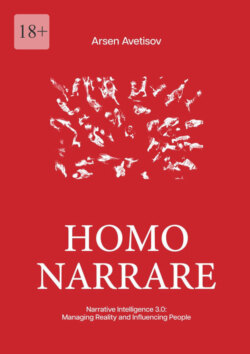Читать книгу Homo narrare. Narrative Intelligence 3.0: Managing Reality and Influencing People - Арсен Аветисов - Страница 9
PART ONE. NEUROPHYSIOLOGY
How We Decide and Do We Really Decide?
We don’t choose; we just tell ourselves about our choices.
ОглавлениеBe careful of your thoughts – they are the beginning of acts.
Lao Tzu
We do not know how we make decisions; we only know what we intend to do. Several decades ago, Daniel Goleman introduced an important thesis: humans actually make decisions emotionally, then use their consciousness to justify and rationalize those decisions. This process unfolds so seamlessly and skillfully that we rarely question the order in which decisions are made.
Living under the illusion of «conscious choice,» people seek to confirm their worldview and maintain the integrity of their personality – or what they perceive as their personality. The process of «self-acknowledgment» involves numerous factors influencing their thinking, actions, and outcomes. Given the multitude of these factors, their combination sometimes results in paradoxical, absurd, or meaningless decisions.
For example, one influencing factor is social desirability – the need to be accepted by one’s peers. Another is the tendency to embrace pleasant information more readily than unpleasant information. By assembling these factors like Lego blocks, people can be subtly and painlessly coerced into doing one thing over another. They may be led to act modestly or submissively, aggressively or in strict adherence to pre-established rituals.
There is much we cannot yet explain but perceive as ordinary, recurring coincidences or random events. For instance, how someone occasionally guesses another’s thoughts, even though no material explanation exists for this phenomenon. Or how the brain constantly seeks reassurance in the possibility of choice, comforting itself with the notion that change or influence is still attainable. The essence of this illusion lies in the brain’s «unconscious» selection of decisions, later framed and explained as conscious choices. It selects from what it already knows, associates with such choices, and can rationalize.
These explanations serve as confirmations of one’s conceptuality, strategy, and behavioral control – but not the behavior itself. This is evident in cases of inexplicable, superstitious, or ritualistic behavior. Consider soccer players kissing the field as they enter, top executives wearing a special tie for important presentations, or mafiosi meeting their end despite their «lucky» coats. These rituals and superstitions effectively signify people enlisting their subconscious in the service of their success.
The recurring narratives of lucky ties and coats increasingly influence individuals and entire generations. Immersion in such narratives leads to overlooking the most important thing – life itself. One might live someone else’s life, pursuing goals that are not their own. At the very least, one should have a general guide – a quick start manual – on how this all works: what captures attention, how memory functions, how decisions are made and based on what, how judgments are formed, and how perceptions of the world are constructed.
Many play video games and expect each subsequent level to be harder than the last. Players are prepared for this. But who said that each subsequent stage of life or history should be easier than the one before? Essentially, this is merely an expectation – a desired picture we have created in our minds. Who promised us such a picture besides ourselves? No one. We told it to ourselves.
The readiness for increasing difficulty in video games stems from the fact that the game and its rules were invented by players. It is merely a model with a predefined scenario and anticipated conclusion. But in real life, the concept of a «game» is different. We create narratives but do not always adhere to the rules of the environment in which they unfold. We demand and expect rewards for each stage of life but fail to do what is necessary to achieve them. We crave peace, stability, prosperity, and well-being simply because it is written into our narrative. But such things are not part of the environment’s rules. Perhaps the chosen narrative does not align with our aspirations and capabilities.
When expectations clash with the emerging reality, a conflict – a drama – arises. What is the purpose of such narratives if we should have better understood the language in which they are written in the first place? We should create a higher-quality game code so we do not have to search for errors and rewrite entire blocks of our lives later.
«Effective» experience is the repeated practice of illusions. The experience of quick results from actions, from pressing buttons and clicking a mouse, lacks meaningful content, leading to the reinforcement of superficial attitudes toward reality. As a result, people today readily accept both scientific and conspiratorial theories of events, backing them up with randomly created but conveniently fitting facts. This is done as quickly as the subsequent disappointment in such constructs sets in. The nature of the processes that create and destroy these assumptions and narratives remains unexamined. The world lives in a constant state of impatience and expectation.
Understanding the driving narratives provides an advantage in controlling and directing events. The paradox is that even when studying their narratives, people rarely attempt to build a system. It all boils down to telling themselves yet another story about the system. Facts mean little to people unless they are arranged into a story. It is not facts but stories that help us plan, predict changes, and survive.
Everything in the world evolves according to its own scale of unpredictability and levels of expectation. It is easy to believe that our expectations are also secretly controlled and, depending on the political situation, steered in a particular direction. The key is that there is some truth to this.
